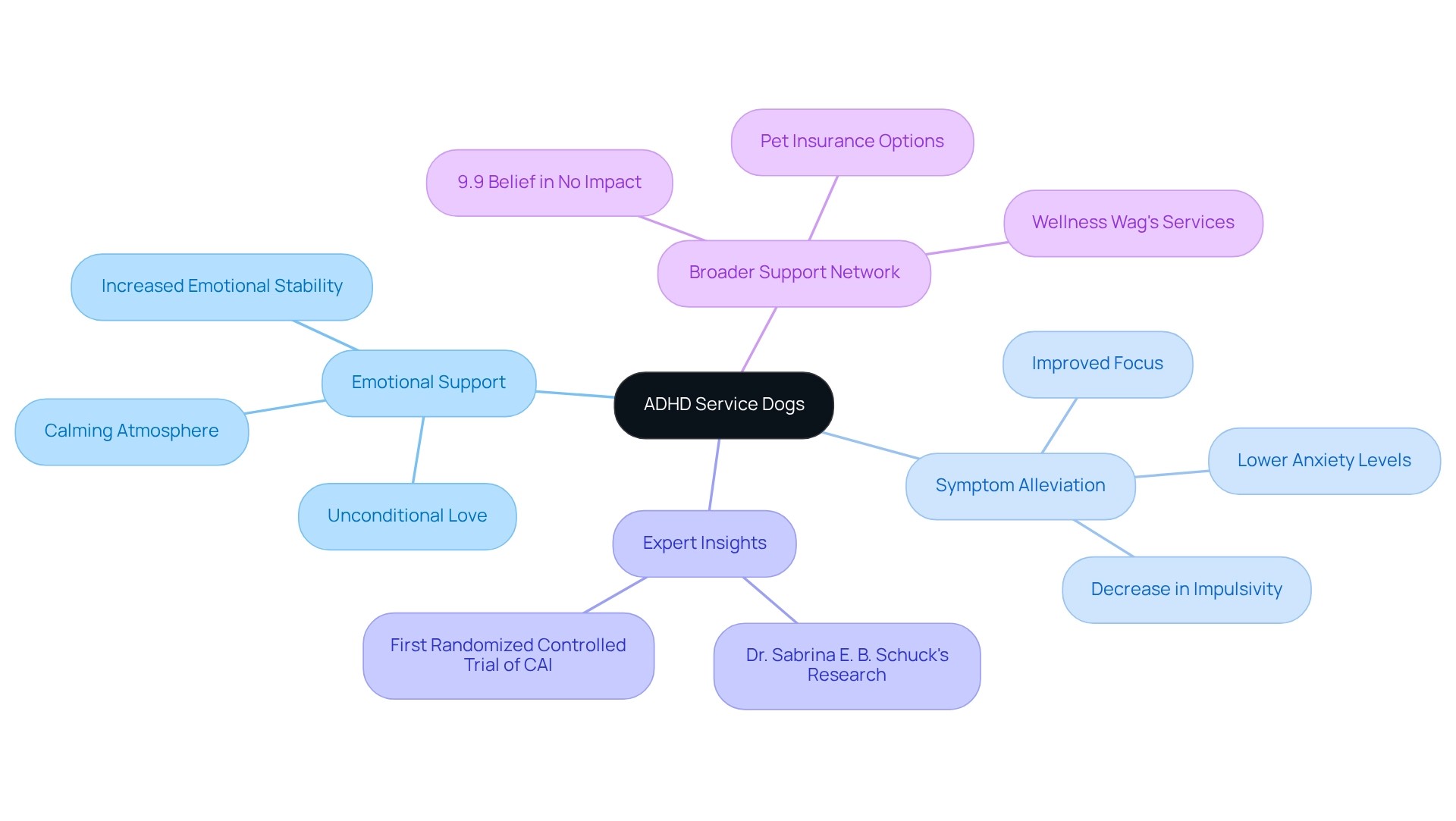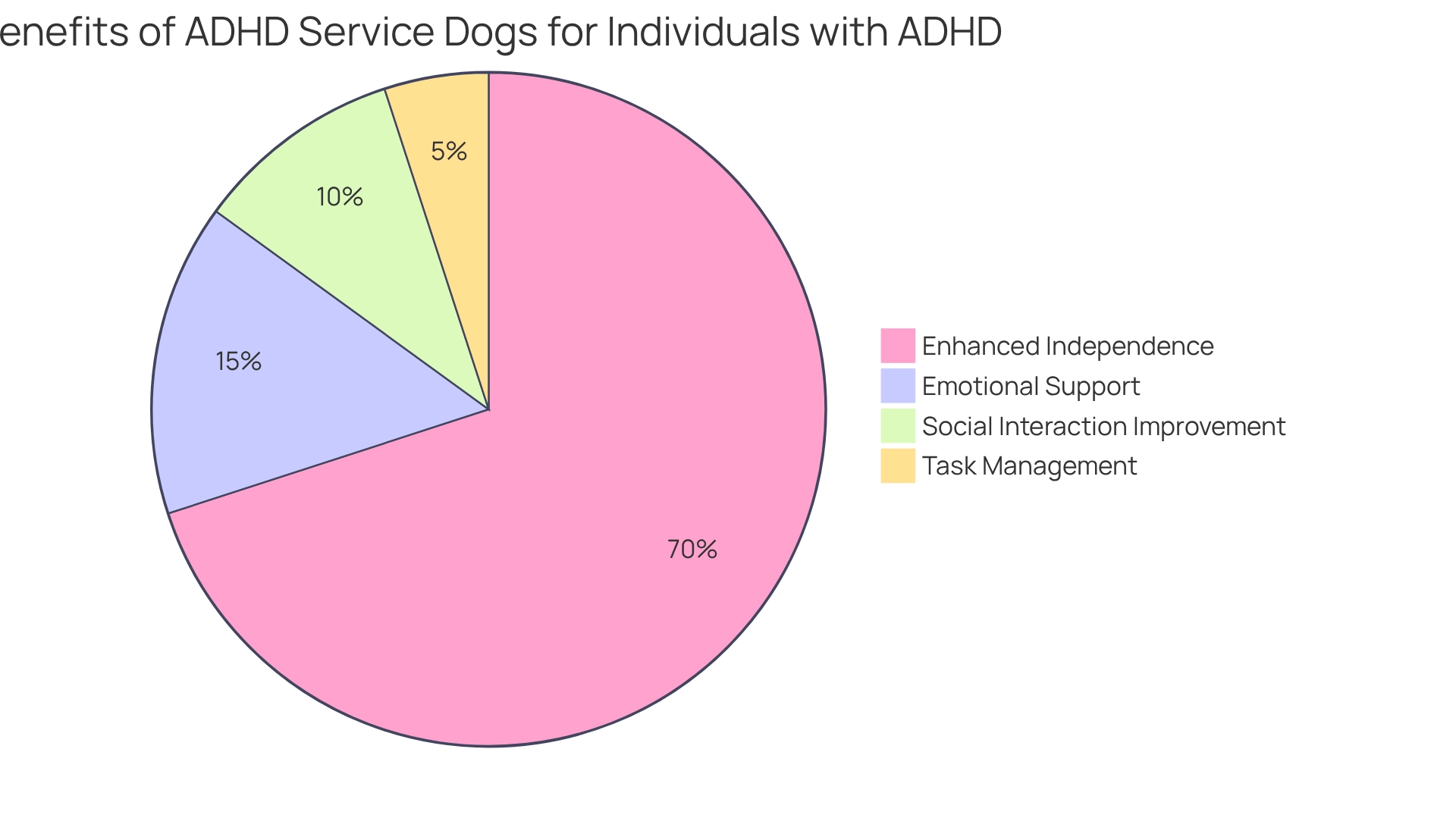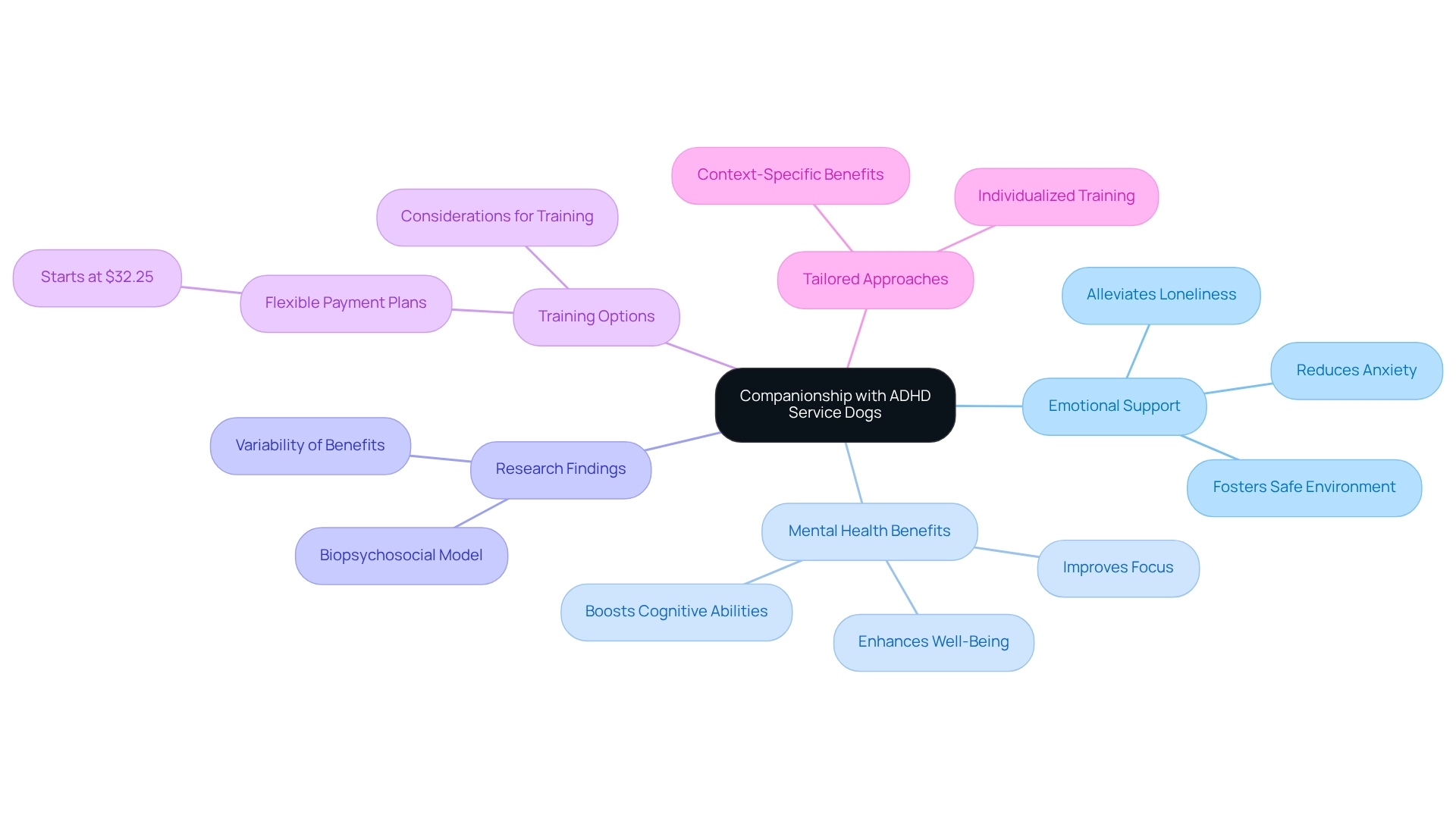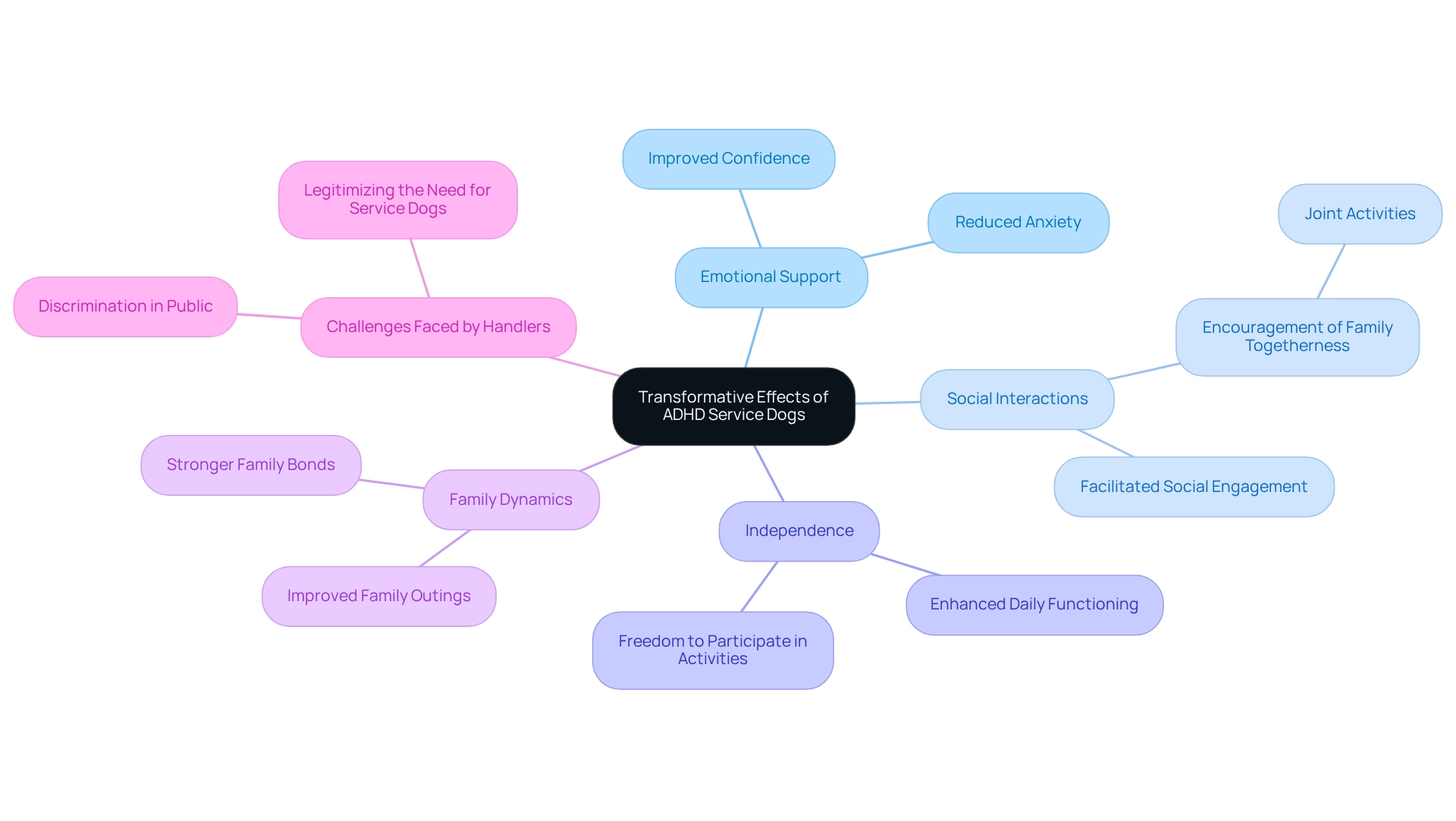

7 Ways an ADHD Service Dog Enhances Daily Life and Well-Being
by Lena Park
Last updated: July 11, 2025
Verified and Approved by:
Angela Morris,
MSW, LCSW
Fact Checked

Overview
Individuals with ADHD often face emotional challenges that can impact their daily lives. The presence of ADHD service dogs can provide the emotional support needed to navigate these difficulties. These remarkable animals not only enhance well-being but also improve social interactions and assist with daily tasks. By fostering independence, reducing anxiety, and facilitating social engagement, service dogs play a crucial role in helping individuals manage their ADHD symptoms more effectively.
Imagine the comfort of knowing that a loyal companion is by your side, ready to help you tackle the challenges of everyday life. The bond between a service dog and their handler can significantly improve the overall quality of life for those living with ADHD. With their assistance, individuals can experience a newfound sense of freedom and connection to the world around them.
As you reflect on your own experiences, consider how the companionship of a service dog could transform your journey. The emotional support they provide can be a game-changer, leading to greater confidence and social engagement. Remember, you are not alone in this journey; support is available, and service dogs can be a vital part of that support system.
Introduction
In a world where mental health challenges are increasingly recognized, the role of service dogs in supporting individuals with ADHD emerges as a beacon of hope. These specially trained companions offer more than companionship; they provide crucial emotional support and practical assistance that can profoundly transform daily life. Imagine the relief of having a loyal friend by your side, enhancing focus and reducing anxiety while fostering social interactions. The benefits of having a service dog are not just anecdotal; they are backed by research and real-life success stories.
As more people seek to understand the legal rights and training requirements associated with these invaluable animals, the conversation around their impact on quality of life continues to grow. This article delves into the multifaceted advantages of ADHD service dogs, highlighting their importance in empowering individuals to navigate the complexities of their condition with greater independence and confidence.
Wellness Wag: Streamlined ESA Letter Services for ADHD Support
At Wellness Wag, we understand the emotional challenges faced by individuals with attention deficit hyperactivity disorder (ADHD) and the role an ADHD service dog can play in addressing these challenges. The journey to finding the right support can feel overwhelming, and that’s where we come in. Our platform offers a simple and efficient way to acquire Emotional Support Animal (ESA) letters, specifically designed for those navigating the unique hurdles associated with acquiring an ADHD service dog.
The process begins with a brief evaluation to determine eligibility, followed by personalized consultations with certified healthcare providers who truly understand your needs. Once approved, you’ll receive your official ESA letter within 24 hours, ensuring you have prompt access to the support you deserve. After placing an order, you will also receive a confirmation email detailing your purchase, which is crucial for tracking your order. This service is particularly beneficial for those living in pet-restricted accommodations, empowering you to advocate for your rights under the Fair Housing Act.
As the therapeutic benefits of animal companionship gain recognition, especially for mental health conditions like ADHD, Wellness Wag is here to meet the rising demand for ESA letters and assist those who may benefit from an ADHD service dog. Our assistance includes a rapid evaluation tailored to your emotional support needs, followed by a thorough assessment to confirm eligibility. Once confirmed, you will receive a professionally crafted ESA letter with legal recognition, typically within 24 hours of your consultation.
This efficient and affordable solution not only provides legal protections but also supports you in navigating the complexities of emotional support animal registration. As Isabelle, an international business and life coach, beautifully expresses, “Taking care of your animal brings a much-needed structure to your day.” This sentiment resonates deeply with the ongoing national conversations about mental health, underscoring the vital role that human-animal connections play in enhancing well-being.
Furthermore, understanding the varying prevalence of assistance animals, such as the ADHD service dog, in different areas can provide important context for the necessity of ESA letters, particularly for those seeking support related to ADHD. If you have any questions or concerns about the process, please don’t hesitate to reach out to us at [email protected].
ADHD Service Dog Tasks: Enhancing Daily Functionality
ADHD service dogs are trained to perform a variety of tasks that greatly enhance daily functionality for their handlers. These tasks include:
- Alerting: Service dogs gently remind their handlers to stay focused or take necessary breaks, helping to maintain attention and productivity throughout the day.
- Deep Pressure Therapy: By applying gentle pressure, these animals provide a calming effect, alleviating anxiety during stressful moments.
- Medication Reminders: Service animals can nudge or bring medication to their owners at scheduled times, ensuring adherence to treatment plans.
- Grounding Techniques: In overwhelming situations, an ADHD service dog assists their handler in regaining focus, which is essential for managing attention deficit hyperactivity disorder symptoms.
Studies show that roughly 70% of people with attention deficit hyperactivity disorder report enhanced concentration and decreased anxiety when matched with an ADHD service dog. These tasks not only aid in symptom management but also foster a sense of independence and confidence in individuals with ADHD, especially when supported by an ADHD service dog. Have you ever considered how an assistance animal might change your daily routine? Organizations such as Atlas Assistance Dogs empower clients to train their own assistance animals, enhancing their quality of life. One success story involves a client who, after training their assistance dog, reported a significant decrease in anxiety levels and an increase in daily productivity. Genevieve, a biologist and science writer, highlights the significance of these creatures, stating, “The companionship and support offered by assistance can change the lives of people with attention disorders, enabling them to excel in their everyday tasks.” By offering practical assistance, service animals play an essential role in helping individuals manage everyday obstacles with more ease. Reflecting on these experiences can remind us of the profound impact support can have on our lives.

Emotional Support: How Service Dogs Alleviate ADHD Symptoms
ADHD service dogs play a vital role in providing emotional support for individuals with ADHD, profoundly influencing their everyday lives. The presence of these animals creates a calming atmosphere, helping to alleviate feelings of anxiety and restlessness. This emotional bond is essential, allowing individuals to experience unconditional love and companionship, which can lead to a significant decrease in symptoms such as impulsivity and inattention.
Companionship from assistance animals can enhance focus and security, enabling individuals to manage daily tasks with greater comfort. For instance, research has shown that emotional support from an ADHD service dog can improve emotional control and lower anxiety levels, which are common challenges for those with attention deficit hyperactivity disorder. Interestingly, 9.9% of participants believe that pet ownership would not affect their mental well-being, underscoring the importance of these animals in therapeutic settings. Additionally, mental health professionals recognize the substantial impact that an ADHD service dog can have on the symptoms of ADHD. Dr. Sabrina E. B. Schuck notes that this research represents the first recognized randomized controlled trial of Companion Animal Interventions (CAI) for children with ADHD, emphasizing how the structured routine of caring for a dog can instill a sense of responsibility and purpose, further aiding in symptom management. Case studies reveal that individuals with ADHD who interact with therapy animals often experience increased emotional stability and improved social interactions, highlighting the diverse benefits of this companionship.
Furthermore, the introduction of pet insurance options by Wellness Wag supports clients in managing their pets’ health and well-being, illustrating the broader support network available for pet owners. In conclusion, ADHD service dogs not only provide emotional support but also play a crucial role in alleviating symptoms associated with ADHD, making them invaluable companions for those navigating the challenges of this condition.

Legal Rights: Navigating Service Dog Access for ADHD Owners
Individuals with ADHD who utilize an ADHD service dog benefit from strong protections under the Americans with Disabilities Act (ADA). This important legislation grants them the right to bring their support animals into public spaces where pets are typically not allowed, ensuring that they can access vital services and environments without bias. Additionally, the Fair Housing Act empowers these individuals to seek reasonable adjustments in housing situations that impose pet restrictions, allowing them to live with their assistance dogs even in ‘no pet’ settings.
Understanding these legal rights is crucial for assistance dog owners, as it equips them to navigate potential challenges effectively. For instance, statistics reveal that 12.1% of individuals have faced rejection of rental applications due to ‘no pet’ policies, which can significantly impact assistance dog owners struggling to find suitable housing. Real-life accounts illustrate how ADA protections have enabled assistance dog owners to advocate for their needs in various public contexts.
The current legal hurdles faced by owners of an ADHD service dog often stem from misunderstandings regarding the ADA and Fair Housing Act. Expert insights highlight the importance of landlords and public service providers being knowledgeable about these laws to prevent discrimination. As emphasized by the team at Highland Canine Service Dogs, “Landlords should ensure they understand the Fair Housing Act and other relevant laws concerning assistance animals.” By being informed and proactive, owners of an ADHD service dog can ensure their companions are recognized as essential support, enhancing their daily lives and overall well-being.
Moreover, it is vital to respect the working status of assistance dogs. Interacting with an assistance dog without consent can disrupt their important duties and compromise the safety and welfare of their handlers. It is best to provide the service dog and their handler with space, observing proper etiquette to maintain their focus and effectiveness.
Resources such as Wellness Wag offer invaluable support for individuals seeking Emotional Support Animal (ESA) letters, further reinforcing their rights and needs. With a mission to empower individuals through accessible consultations and reliable documentation, Wellness Wag exemplifies how such resources can assist over 50,000 patients in navigating their legal rights effectively, ensuring that emotional support animals are embraced for their transformative companionship.
Training Requirements: Preparing Service Dogs for ADHD Assistance
Training an ADHD service dog for support encompasses several essential elements that ensure the dog can effectively aid its handler. Basic obedience training serves as a crucial foundation, ensuring the ADHD service dog responds reliably to commands and establishing a strong communication bond between the handler and the dog. This bond is vital for creating a safe and supportive environment, and task-specific training is another key component, as an ADHD service dog can be trained to perform specific tasks that directly alleviate symptoms of ADHD. This may involve notifying the handler about distractions or providing deep pressure therapy during moments of anxiety or overwhelm. Such tailored support can make a significant difference in daily life.
Socialization is equally important for assistance animals, as it exposes them to various environments and situations. This training helps the dog remain calm and focused in public settings, which is essential for effective assistance. The journey of training typically spans several months and requires consistent effort from the handler. It’s important to recognize that around 50% of all assistance dog candidates do not complete their training, underscoring the need for a structured and nurturing training environment. Moreover, the broader context of the animal-assisted workforce, comprising approximately 4.28 million individuals, highlights the vital role that an ADHD service dog can play in supporting those with attention deficit hyperactivity disorder and other conditions. Effective training programs for an ADHD service dog helping individuals with ADHD often integrate a blend of these elements, ensuring the canines are well-prepared to meet the unique needs of their handlers. However, potential owners should also consider the financial implications, as veterinary fees during the training of assistance animals can be substantial. Here are some important statistics to reflect on:
- 47% of pet owners have faced pet-related debt.
- 42% find it challenging to manage unexpected veterinary expenses, which can average between $800 and $1,500 for emergencies.
With the right approach, an ADHD service dog can profoundly enhance daily life and well-being for individuals navigating ADHD. It’s also crucial for potential owners to be cautious of online puppy scams and to contemplate the responsibilities associated with pet health expenses when seeking a support dog. What does your pet mean to you?
Social Benefits: Improving Relationships with ADHD Service Dogs
ADHD service dogs play a crucial role in enhancing social interactions for individuals with ADHD. They serve as natural conversation starters, helping to bridge communication gaps and alleviate feelings of isolation. The presence of an assistance dog can transform social situations, making them less intimidating and encouraging individuals to engage more freely with others. This dynamic not only fosters connections but also nurtures a sense of belonging.
Moreover, the bond between the handler and their assistance dog significantly contributes to overall social well-being. Research shows that individuals with ADHD who have an ADHD service dog experience marked improvements in their social interactions. For instance, a study revealed that the frequency of interactions with live dogs is comparable to those with stuffed animals, underscoring the tangible impact of genuine companionship. Additionally, demographic factors such as age and background may influence how effectively assistance animals enhance social interaction.
Real-life stories further illustrate these benefits. Many individuals report increased confidence in social settings after welcoming assistance animals into their lives, leading to more frequent outings and interactions. In fact, participants noted a rise in their evening activities after acquiring assistance animals, highlighting the positive effect on social engagement. This transformation not only enriches their social life but also fosters a greater sense of community and support.
As Dr. Leanne Nieforth, a researcher in the field, poignantly states, “Understanding how AAIs work helps refine these interventions, making them more effective for children who might struggle with traditional methods.” This expert affirmation underscores the importance of ADHD service dogs in enhancing social interactions for individuals with attention deficit hyperactivity disorder.
In conclusion, ADHD service dogs provide not only emotional support but also serve as essential tools for improving social interactions among individuals with ADHD, ultimately enriching their daily lives and nurturing deeper connections with others.
Financial Considerations: Budgeting for an ADHD Service Dog
Obtaining a support dog represents a significant financial commitment, with costs typically ranging from $15,000 to $30,000 or more, influenced by factors such as the dog’s breed and the level of training required. Beyond this initial investment, prospective owners need to consider ongoing expenses, including food, veterinary care, and additional training sessions. These recurring costs can accumulate over time, making it crucial for potential owners to develop a detailed budget.
In addition to financial considerations, it is essential for prospective assistance dog owners to understand their legal rights under the Americans with Disabilities Act (ADA). Assistance dog owners enjoy complete public access rights, allowing them to bring their assistance dogs into various public spaces, including restaurants, stores, libraries, and public transportation. They are also entitled to housing accommodations, even in areas where pets are usually restricted. This understanding can empower owners to navigate potential challenges and ensure they can fully benefit from the companionship of their assistance dog.
To alleviate some of the financial burden, individuals should actively seek financial aid options. Grants, fundraising initiatives, and community support can provide valuable resources to help offset the costs associated with acquiring and maintaining an assistance dog. Many reputable organizations offer transparent information about their training methods and related expenses, which can assist in making informed decisions. This clarity is vital, as it enables potential owners to fully grasp the financial implications and select organizations that align with their budgetary needs.
Understanding the full spectrum of financial responsibilities, along with the legal rights of assistance dog ownership, is crucial for ensuring that individuals can adequately care for their assistance dog’s needs. Numerous case studies reveal that many owners have successfully navigated these financial challenges by utilizing available resources and support systems, ultimately enhancing their quality of life through the companionship of their assistance animals. Moreover, it’s important to note that 11% of individuals with an ADHD service dog reported a lack of public awareness regarding service animals as a drawback, which can affect funding and community support efforts. By preparing in advance and exploring various financial options, while also being aware of their rights, potential owners can make the fulfilling decision to incorporate an ADHD service dog into their lives, particularly for those facing challenges such as attention deficit hyperactivity disorder.
Independence: How Service Dogs Empower Individuals with ADHD
ADHD service dogs play a vital role in empowering individuals with attention deficit hyperactivity disorder (ADHD), enhancing their autonomy and helping them navigate daily challenges. These specially trained companions help manage tasks, maintain focus, and facilitate social interactions, which can often feel overwhelming for those facing attention difficulties. Research indicates that individuals with assistance animals experience significant improvements in self-sufficiency, with studies revealing that 70% of participants reported enhanced independence in everyday tasks. This statistic underscores the transformative impact that an ADHD service dog can have on the lives of individuals with ADHD.
The presence of an assistance dog fosters a sense of confidence, enabling individuals to pursue personal and professional goals more effectively. For instance, a case study involving a young adult with ADHD demonstrated that their assistance dog not only helped manage anxiety in social situations but also improved their ability to accomplish tasks independently, leading to a more fulfilling life. Wellness Wag has supported over 50,000 patients by providing ESA letters that grant access to the emotional support these individuals need. As one satisfied client, Linda S., shared, “Applying for an ESA through Wellness Wag was the best decision I made. It was an effortless process, and the team was very professional.”
Moreover, an ADHD service dog provides essential emotional support for individuals grappling with the challenges of ADHD. By offering companionship and a sense of safety, these animals help reduce feelings of isolation and enhance overall well-being. Consequently, many individuals report a significant increase in their overall quality of life, further illustrating the transformative effect of assistance dogs on independence and self-empowerment.
Obtaining an ESA letter from Wellness Wag is a straightforward process, designed to be efficient and accessible. Flexible payment options for these vital services start at just $32.25, making them available to a broader audience. As noted by Sabrina E. B. Schuck, the emotional benefits of having an ADHD service dog as a companion are substantial, further emphasizing the importance of these support systems for individuals with ADHD.

Companionship: The Emotional Connection with ADHD Service Dogs
The connection between individuals with attention deficit hyperactivity disorder (ADHD) and their ADHD service dog is not only important; it is truly life-changing. An ADHD service dog provides companionship and emotional support that significantly alleviates feelings of loneliness and anxiety—common challenges faced by those with ADHD. The unwavering affection and loyalty of a therapy dog foster a safe environment, allowing individuals to express their emotions freely and navigate their daily struggles with greater ease.
Research underscores that the emotional bond between people with ADHD and their ADHD service dog plays a crucial role in enhancing mental health outcomes. For instance, studies reveal that interactions with assistance animals can boost cognitive abilities and enrich educational experiences, reinforcing the notion that these animals are more than mere companions; they are vital to the therapeutic journey.
As Dr. Sabrina E. B. Schuck notes, “families now have a viable option when looking for alternative or supplementary therapies to medication treatments for attention deficit issues, particularly regarding impaired focus.” By providing a reliable source of comfort and stability, an ADHD service dog significantly improves the overall well-being of individuals with ADHD, making them essential partners in the quest for better mental health.
Furthermore, considering the biopsychosocial model can deepen our understanding of how human-animal interactions influence health and well-being. For those interested in assistance dog training, it’s encouraging to know that flexible payment plans start as low as $32.25, making this supportive option more accessible. The benefits of canine interaction on cognition and learning may vary depending on the context, highlighting the importance of tailored approaches in effectively utilizing assistance animals.

Quality of Life: Transformative Effects of ADHD Service Dogs
ADHD assistance dogs can significantly enhance the quality of life for their handlers. These specially trained animals offer emotional support, facilitate social interactions, and assist with daily tasks, enabling individuals to manage their symptoms more effectively. The presence of an assistance dog fosters enhanced confidence and reduces anxiety, leading to a stronger sense of independence. Studies indicate that quality of life ratings for children with disabilities improved significantly following the introduction of assistance animals, with notable advancements observed within just 12 months of placement. This improvement extends to individuals with ADHD, underscoring the profound impact these animals can have on daily living.
Real-world examples vividly illustrate these benefits. Families report that assistance animals not only help their children feel more secure but also encourage family togetherness through joint activities, such as outings that were once intimidating. As one parent of a child with ASD expressed, “The freedom to go out without extensive planning regarding [my daughter with ASD] worries – the dog will help her to feel safer and this will make us closer as a family.” This highlights the emotional support component of assistance animals and their role in improving family dynamics.
Moreover, research has emphasized the challenges faced by caretakers of assistance animals, particularly individuals with unseen disabilities, who often encounter bias in public environments. This discrimination complicates the lives of handlers with attention difficulties, making it essential to legitimize their need for these animals. Overall, the integration of ADHD service dogs into the lives of individuals with ADHD represents a powerful tool for enhancing well-being and daily functioning, as many service users express gratitude for the life-changing effects of having an assistance dog.

Conclusion
The integration of service dogs into the lives of individuals with ADHD brings forth profound benefits that extend far beyond mere companionship. These specially trained animals offer essential emotional support, practical assistance, and a sense of independence that can significantly enhance daily living. Can you imagine how much easier it would be to navigate daily challenges with a loyal companion by your side? From improving focus and reducing anxiety to fostering social interactions, service dogs become invaluable allies in managing ADHD symptoms.
Furthermore, the legal protections granted to service dog owners under the Americans with Disabilities Act and the Fair Housing Act empower individuals to advocate for their rights. This ensures they can access public spaces and suitable housing alongside their service dogs. Understanding these rights is crucial for maximizing the benefits of having a service dog and navigating any potential challenges that may arise.
Financial considerations also play a vital role in this journey, as prospective owners must prepare for the initial investment and ongoing costs associated with service dog care. However, resources like Wellness Wag offer accessible pathways to obtain the necessary documentation and support, making the process more manageable. Have you thought about how these resources can ease your journey?
Ultimately, the bond between individuals with ADHD and their service dogs is transformative, fostering emotional connections that enhance mental health and overall quality of life. As awareness of these benefits grows, so does the potential for service dogs to empower individuals with ADHD, helping them lead more fulfilling and independent lives. Remember, you are not alone in this journey; support is available, and the companionship of a service dog can truly make a difference.
Frequently Asked Questions
What emotional challenges do individuals with ADHD face?
Individuals with ADHD often experience emotional challenges such as anxiety, impulsivity, and inattention, which can significantly impact their daily lives.
How can an ADHD service dog help individuals with these challenges?
ADHD service dogs can assist by providing emotional support, performing tasks like alerting, deep pressure therapy, medication reminders, and grounding techniques, which help manage symptoms and enhance daily functionality.
What is the process to acquire an Emotional Support Animal (ESA) letter through Wellness Wag?
The process begins with a brief evaluation to determine eligibility, followed by personalized consultations with certified healthcare providers. Once approved, you will receive your official ESA letter within 24 hours.
How does Wellness Wag support individuals in obtaining an ESA letter?
Wellness Wag offers a simple and efficient platform to acquire ESA letters, tailored to those navigating the unique hurdles of acquiring an ADHD service dog, including rapid evaluations and thorough assessments.
What legal protections do ESA letters provide?
ESA letters provide legal recognition that supports individuals in pet-restricted accommodations, allowing them to advocate for their rights under the Fair Housing Act.
What percentage of people with ADHD report benefits from having an ADHD service dog?
Studies show that approximately 70% of people with ADHD report enhanced concentration and decreased anxiety when matched with an ADHD service dog.
What emotional benefits do ADHD service dogs provide?
ADHD service dogs create a calming atmosphere, alleviate anxiety and restlessness, and foster companionship, which can lead to a decrease in impulsivity and inattention.
How does the companionship of an ADHD service dog influence daily tasks?
The companionship of an ADHD service dog enhances focus and security, enabling individuals to manage daily tasks with greater comfort and emotional stability.
Are there any additional support options available for pet owners through Wellness Wag?
Yes, Wellness Wag offers pet insurance options to support clients in managing their pets’ health and well-being, further enhancing the support network for pet owners.
How can individuals reach out to Wellness Wag for questions or concerns?
Individuals can contact Wellness Wag at [email protected] for any questions or concerns regarding the process of obtaining an ESA letter or ADHD service dog support.
Certify Your Emotional Support Animal Today

Why You Can Rely on Us?
At Wellness Wag, we believe your pet deserves care rooted in both science and compassion. Each article is carefully researched, written in clear language for pet owners, and then reviewed by qualified professionals to ensure the information is evidence-based, current, and practical for real-life care. Our goal is to help you feel confident in making informed decisions about your pet’s health and well-being.
Reviewed by
Angela Morris, MSW, LCSW
Angela is a licensed clinical social worker with 20 years of experience in patient advocacy and community mental health. She has assisted numerous clients with ESA evaluations and brings a deep understanding of disability accommodations, ensuring that all information is accurate, supportive, and practical.

Written by :
Lena Park
Last Updated :
July 11, 2025












